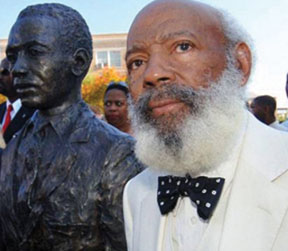
James Meredith on Black America: We’re ‘failing our young people’
By Maria Lloyd
In recognition of Black History Month, Civil Rights activist Dr. James Meredith spoke to 300 majority African-American people at J.F. Drake State Technical College in Huntsville, AL. Dr. Meredith, famously known for being the first African-American to attend University of Mississippi in Ox-ford, MS, spoke to the audience about carrying out the work of God and raising children.
Dr. Meredith said society today is turning its back on the Bible and children. “My present mission from God is to get the Black people in Mississippi to do for themselves all they can do to improve their lives,” he said. “The truth of the matter is we Black people are failing our young people. Usually, we’re blaming somebody else in the past as being the reason.”
The 79-year-old author of 16 books also encouraged the audience to mentor a child. “Why did the religious leaders pass their brother by and not help him?” Dr. Meredith asked. “It may be the same reason we old folks today fail to do our job. Those preachers probably asked the wrong question: What will happen to me if I help this man? Like the elders of today, when we see a child in need of guidance, we ask, What will happen to me if I help this child? The question should be, What will happen to this child if I don’t do my job?” The most popular point that Dr. Meredith made during his speech was when he addressed the need of providing children a structured upbringing, and with a 72 percent out-of-wedlock childbirth in the African-American community, a structured upbringing is becoming less and less popular.
Dr. Meredith added that children who have a potential to be a famous athlete get most of the attention. “Every Black boy nine years-old with extra athletic ability has got somebody following them daily,” he said. “Any dumb person can tell if a child has extra special talent – whether they are smart, real smart, average or slow. Right now, we’re losing all our young people because nobody is monitoring them.”
Dr. Meredith accepted questions from the audience and signed copies of his latest work titled, A Mission From God.
